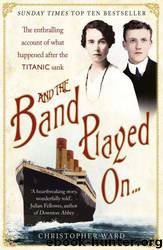And the Band Played on . . .: The Enthralling Account of What Happened After the Titanic Sank by Christopher Ward

Author:Christopher Ward [Ward, Christopher]
Language: eng
Format: epub
Tags: History
ISBN: 9781444707960
Publisher: Hodder & Stoughton
Published: 2012-04-02T05:00:00+00:00
HUME, ANDREW, born Dumfries 7th May 1864. Violinist, bassoonist, banjo player and composer. Pupil of M Sainton. Established in his native city as professor of the above instruments and teacher of music.
Andrew’s entry in the directory came immediately after entries for Alexander Hume and his son William, a most convenient juxtaposition, particularly as his own entry was followed by another Hume, Richard, the famous viol maker who sold fiddles to King James in 1530. People assumed that the four Humes were related, one big family of famous fiddlers. Andrew also included in the entry that he had been a pupil of Prosper Sainton, an endorsement of his untruthful claim to have studied at the Royal Academy of Music. If Sainton, who had died two years earlier, had once given Andrew a lesson it certainly was not at the Royal Academy of Music where there is no record of him in their well-kept archives.
By now, Hume had established himself in Dumfries as a ‘man of position’. At least, this is how his solicitor described him when on 1 November 1892 Hume was arrested for ‘foul-hooking salmon’ in the River Nith and escorted home, dripping wet, by two constables. Grace was not pleased. When the case came up in the Dumfries Sheriff Court two weeks later his solicitor asked the Sheriff to take into consideration his client’s ‘position in the town’ in determining his sentence. It was the first of many appearances Andrew Hume would make in this court over the years and now, as in later arraignments, he lied, telling such whoppers on this occasion that it caused laughter in court. The headline to the long report of the case in the Dumfries & Galloway Standard was ‘Extraordinary Conflict of Evidence’.
It was, as they say, an open-and-shut case. Andrew and a friend, John Bell, a labourer, went down to the river with rods and lines and baited hooks attached. Superintendent Pool saw Hume fishing in the Nith at the far end of the island in the centre of the river. This wasn’t the first time the appropriately named Pool had seen Hume poaching but this time he decided to do something about it. He watched Hume cast his hooks across the stream time and again. He saw him hook a salmon. He observed him haul the salmon on the line to the Dumfries side of the river where he handed his rod to Bell while Hume gaffed the fish. A large crowd had gathered and witnesses corroborated Pool’s evidence. The fish, hooked and gaffed, was recovered. A fair cop, you might think.
Yet Andrew Hume pleaded not guilty. He wriggled like a fish caught on the end of a line, desperate to get off the hook. He said he hadn’t done it. He said the superintendent could not have seen them because some clothes that were hanging on railings obscured his view. Then he said he believed they were entitled to be fishing there with baited barbs. Far from taking Hume’s ‘position
Download
This site does not store any files on its server. We only index and link to content provided by other sites. Please contact the content providers to delete copyright contents if any and email us, we'll remove relevant links or contents immediately.
| France | Germany |
| Great Britain | Greece |
| Italy | Rome |
| Russia | Spain & Portugal |
Fanny Burney by Claire Harman(26603)
Empire of the Sikhs by Patwant Singh(23086)
Out of India by Michael Foss(16853)
Leonardo da Vinci by Walter Isaacson(13336)
Small Great Things by Jodi Picoult(7143)
The Six Wives Of Henry VIII (WOMEN IN HISTORY) by Fraser Antonia(5515)
The Wind in My Hair by Masih Alinejad(5095)
A Higher Loyalty: Truth, Lies, and Leadership by James Comey(4964)
The Crown by Robert Lacey(4817)
The Lonely City by Olivia Laing(4802)
Millionaire: The Philanderer, Gambler, and Duelist Who Invented Modern Finance by Janet Gleeson(4478)
The Iron Duke by The Iron Duke(4356)
Papillon (English) by Henri Charrière(4274)
Sticky Fingers by Joe Hagan(4199)
Joan of Arc by Mary Gordon(4110)
Alive: The Story of the Andes Survivors by Piers Paul Read(4033)
Stalin by Stephen Kotkin(3966)
Aleister Crowley: The Biography by Tobias Churton(3640)
Ants Among Elephants by Sujatha Gidla(3467)
